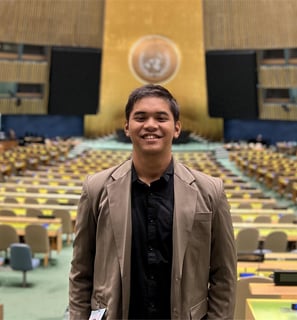The New Indonesian Investment Guidelines for Tourism — An Outlook for Geopark Development
Reimagining Tourism in Indonesia: How Geoparks, Green Investments, and Innovation Are Redefining the Nation’s Development Future.
INSIGHTTOURISM AND HOSPITALITYECONOMIC DEVELOPMENT
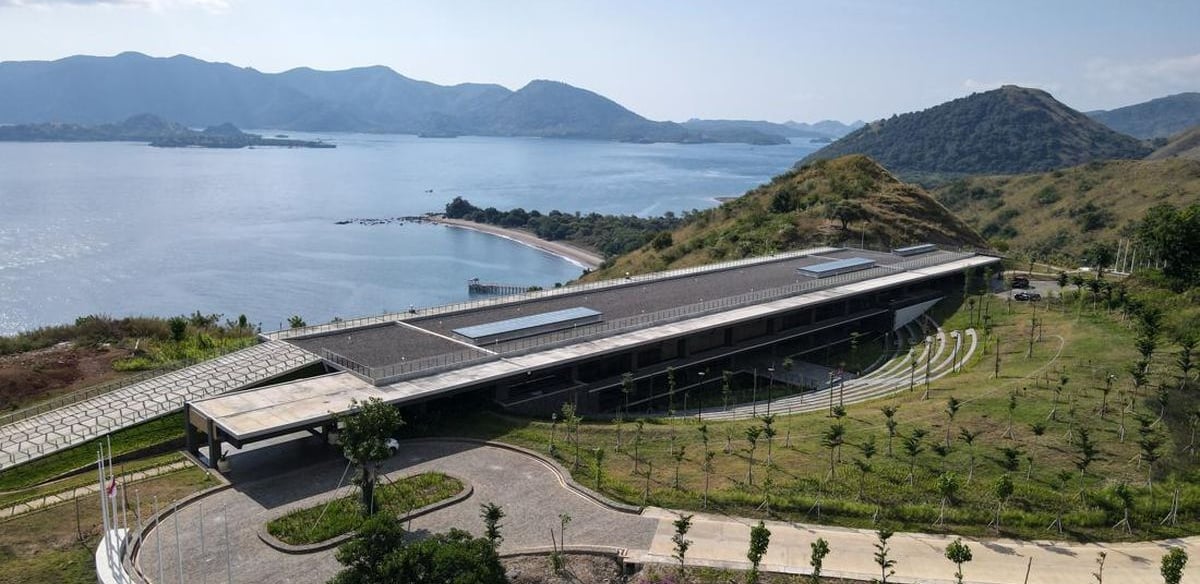

The New Indonesian Investment Guidelines for Tourism — An Outlook for Geopark Development
In the race to redefine tourism in the post-pandemic era, Indonesia has made a decisive pivot — one that shifts focus from extractive mass tourism to regenerative, locally-rooted experiences. With the Ministry of Investment’s new guidelines prioritizing sustainability, digital transformation, and inclusive growth, a rare window has opened for a category long overlooked in national investment strategies: geopark development investments.
Indonesia’s national geoparks — twelve of which are now part of the UNESCO Global Geoparks network — represent more than just geological wonders. They are living landscapes where conservation, education, and sustainable development intersect. The new investment framework presents a powerful opportunity to position these geoparks as flagship models of green tourism — and more importantly, as strategic nodes in Indonesia’s long-term economic diversification.
A Timely Reset: Indonesia's Tourism Investment Strategy
As the global tourism sector rebounds in a post-pandemic world, Indonesia has taken a decisive step to recalibrate its approach to tourism investments. The newly issued guidelines by the Ministry of Investment (BKPM) and the Ministry of Tourism and Creative Economy mark a strategic shift: from mass-tourism-led growth to one anchored in sustainability, inclusiveness, and long-term value creation. Geoparks stand at the heart of this new paradigm.
This move is more than policy housekeeping. It is a bold attempt to redefine Indonesia's place in the global tourism value chain. The guidelines emphasize nature-based tourism, circular economy practices, community participation, and ESG (Environmental, Social, Governance) — aligned financing instruments. For geoparks, this means one thing: it's their moment to shine.
FDI Trends and Indonesia’s Investment Climate
Global foreign direct investment (FDI) flows rebounded by 11% in 2024, reaching USD 1.4 trillion, despite continuing uncertainty in the global economy. While growth is expected to moderate in 2025, improved financing conditions and a resurgence in mergers and acquisitions signal that investors are still pursuing long-term value. Asia and the Pacific remain a major recipient of FDI, drawing between 40% and 45% of global flows — although the region saw a 15.1% decline in 2023.
In contrast, Indonesia’s FDI landscape remains resilient, with USD 60 billion in inflows recorded in 2024 (see Figures 1.1 through 1.4), according to the Ministry of Investment and Downstream Industry (MIDI) and the Indonesia Investment Coordinating Board (IICB). The bulk of investment continues to flow into base metals (17.5%), mining (10.3%), and utilities (10.0%). However, the hotel and restaurant sector — a proxy for tourism — captured 2% of total FDI, equivalent to approximately USD 7.2 billion.
Singapore, China, Japan, and Hong Kong remain Indonesia’s top sources of FDI, signaling sustained regional interest. Yet the low share going toward tourism highlights a crucial opportunity: repositioning geoparks as catalysts for green tourism investments could diversify FDI streams while aligning with national sustainability goals.
Sport Tourism and Entertainment Investment in Geoparks
Sport tourism and entertainment represent powerful vehicles for inclusive economic development, community engagement, and destination branding. Within Indonesia's geopark framework, these sectors offer untapped potential to blend physical activity, cultural expression, and environmental education in ways that boost both visitor numbers and local livelihoods.
Geoparks such as Batur, Ciletuh-Palabuhanratu, and Mount Rinjani provide stunning natural backdrops for hiking festivals, mountain biking competitions, eco-marathons, paragliding, and rock climbing—attracting adventure seekers and wellness tourists alike. These experiences can be developed into anchor events that generate year-round economic activity, especially in rural or underdeveloped regions.
Furthermore, immersive entertainment—ranging from open-air theatre performances and traditional dance showcases to digital storytelling and AR-powered cultural trails—can enhance visitor engagement while supporting the creative economy. By embedding entertainment into the geopark experience, Indonesia can spotlight its rich cultural heritage alongside its geodiversity, elevating its global tourism brand.
Strategic partnerships with sporting federations, entertainment companies, and local creative industries can facilitate investment in infrastructure, training, and promotion. Incentivizing film production and digital media content creation in geopark sites could further position them as dynamic, globally recognized destinations.
Indonesia has had major success in attracting investment in sports tourism in the past, especially in geopark areas as well as national parks with significant geological, biological, and cultural heritage that have the potential to evolve into geoparks. This includes:
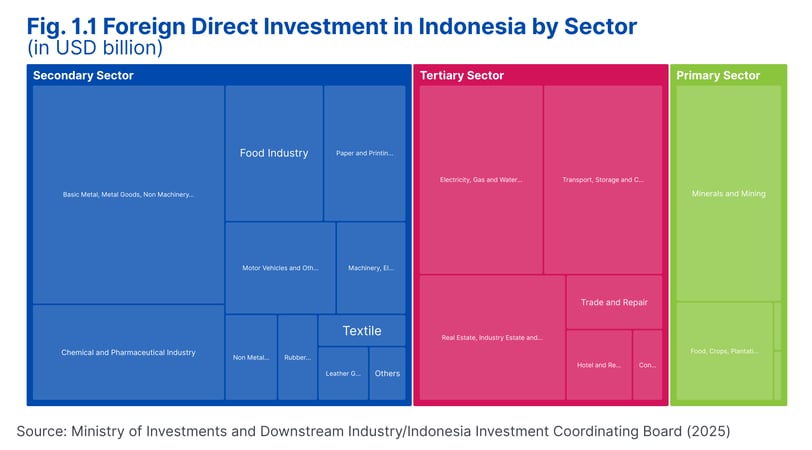

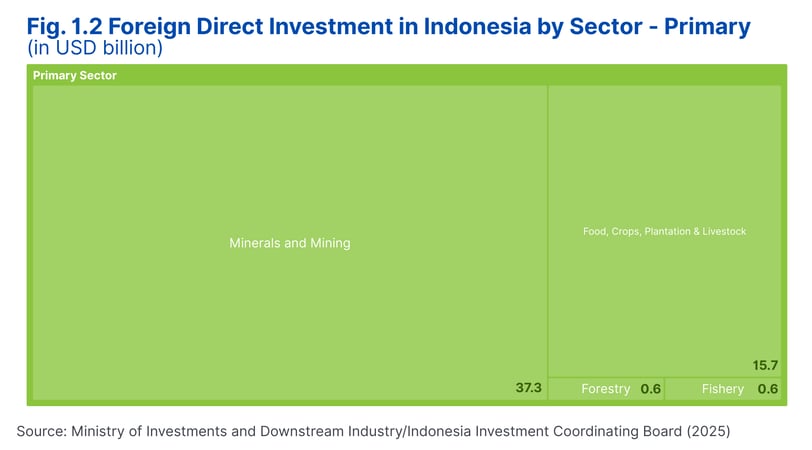

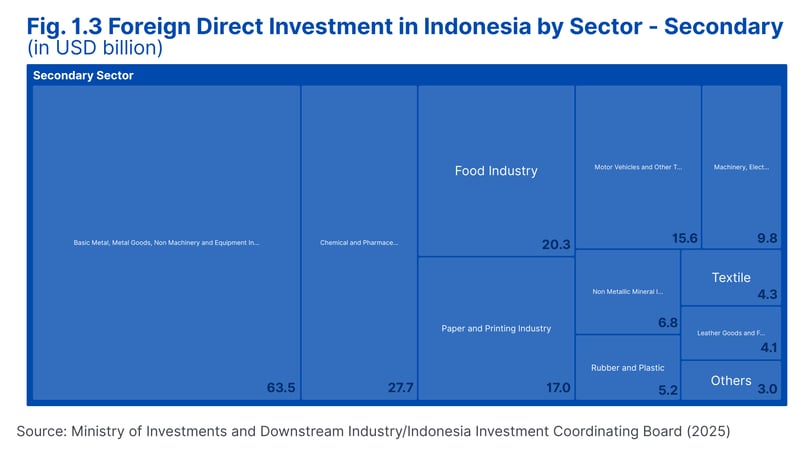

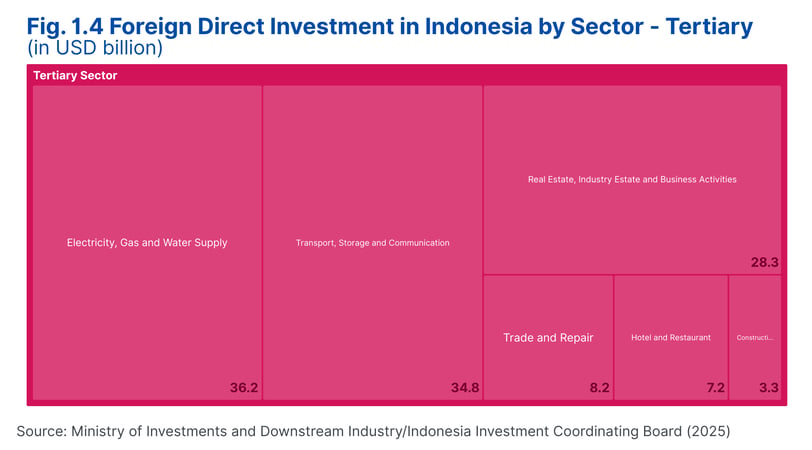

Sport Tourism and Entertainment Investment in Geoparks
Sport tourism and entertainment represent powerful vehicles for inclusive economic development, community engagement, and destination branding. Within Indonesia's geopark framework, these sectors offer untapped potential to blend physical activity, cultural expression, and environmental education in ways that boost both visitor numbers and local livelihoods.
Geoparks such as Batur, Ciletuh-Palabuhanratu, and Mount Rinjani provide stunning natural backdrops for hiking festivals, mountain biking competitions, eco-marathons, paragliding, and rock climbing—attracting adventure seekers and wellness tourists alike. These experiences can be developed into anchor events that generate year-round economic activity, especially in rural or underdeveloped regions.
Furthermore, immersive entertainment—ranging from open-air theatre performances and traditional dance showcases to digital storytelling and AR-powered cultural trails—can enhance visitor engagement while supporting the creative economy. By embedding entertainment into the geopark experience, Indonesia can spotlight its rich cultural heritage alongside its geodiversity, elevating its global tourism brand.
Strategic partnerships with sporting federations, entertainment companies, and local creative industries can facilitate investment in infrastructure, training, and promotion. Incentivizing film production and digital media content creation in geopark sites could further position them as dynamic, globally recognized destinations.
Indonesia has had major success in attracting investment in sports tourism in the past, especially in geopark areas as well as national parks with significant geological, biological, and cultural heritage that have the potential to evolve into geoparks. This includes:
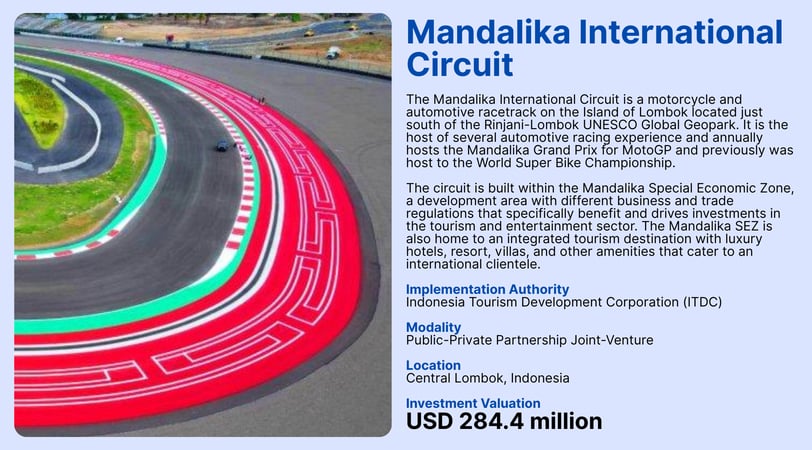

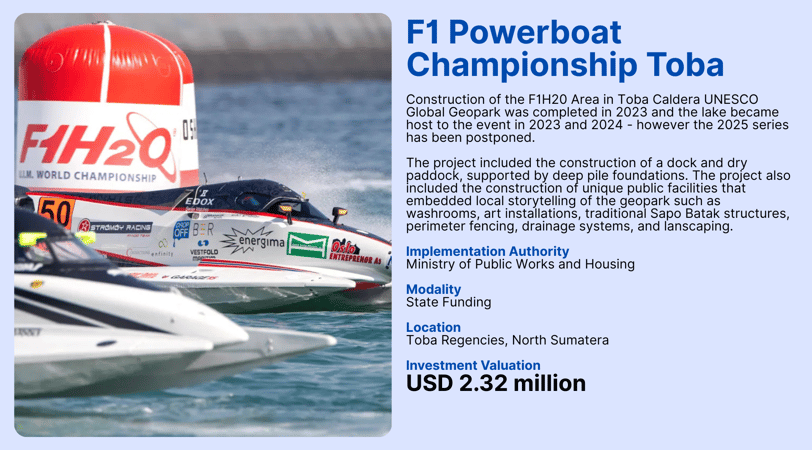

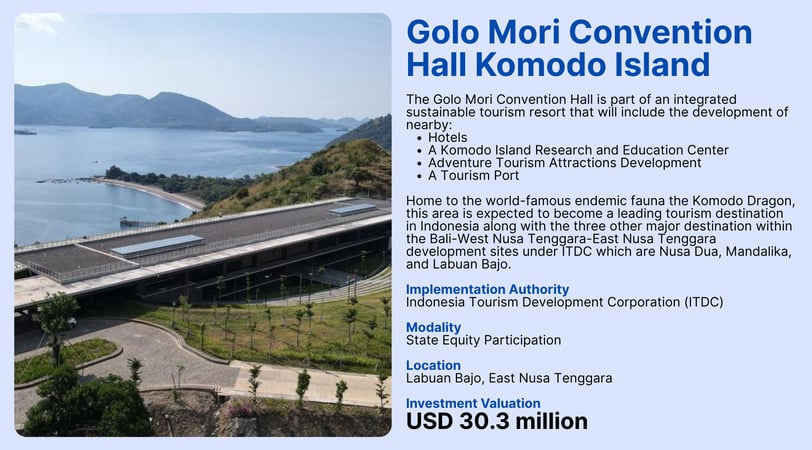

Integrating sport and entertainment into geopark development not only diversifies revenue streams, but also aligns with broader goals of health, education, and community pride. It’s time to view geoparks not just as conservation zones, but as live stages for storytelling, physical challenge, and cultural celebration.
Policy Shift with Purpose
Indonesia’s tourism investment guidelines signal more than a regulatory refresh — they reflect a strategic recalibration. The shift from extractive, high-volume tourism toward regenerative, inclusive, and locally-rooted development aligns with global sustainability goals and Indonesia’s own Vision 2045. These guidelines prioritize low-impact infrastructure, digital transformation, and community-based initiatives — the very pillars that underpin geopark development.
Tourism plays a pivotal role in economic development, generating positive externalities across sectors like hospitality, transport, construction, and food services. Between 2018 and 2024, Indonesia attracted an estimated USD 16.1 billion in tourism investment, with USD 5.6 billion from foreign direct investment and USD 10.5 billion from domestic sources. The hotel and restaurant subsector alone drew in USD 12.2 billion — signaling consistent investor interest, particularly from Singapore and Hong Kong.
At the regional level, greenfield FDI into the tourism cluster in Asia-Pacific totaled USD 52 billion across 445 projects. Indonesia ranked 6th, with 38 projects and a combined investment of USD 4.8 billion, expected to create nearly 100,000 jobs. This demonstrates that Indonesia is already on the map — but still has room to climb.
To enhance its appeal, the government has launched proactive investment facilitation mechanisms, such as the Indonesia Investment Promotion Centre (IIPC), which plays a crucial role in matchmaking investors with sustainable tourism opportunities. Future efforts should focus on creating special tourism investment zones within geoparks, alongside ESG-aligned incentives and impact-focused financial instruments.
Innovation and the Startup Ecosystem: Catalyzing Local Economies
In tandem with regulatory reforms, Indonesia has cultivated a vibrant innovation and entrepreneurship ecosystem tailored to the tourism sector. Key government-led initiatives between 2020 and 2024 include:
Wirausaha Merdeka: Part of the Kampus Merdeka initiative, this now-discontinued program enabled students to engage in entrepreneurship training, mentorship, and field experience, earning up to 20 academic credits.
Aksilarasi Community Development: Supports local communities in developing innovative and entrepreneurial capacities within tourism and creative industries.
Entrepreneur Hub (E-Hub): A collaborative platform integrating ministries, MSMEs, and stakeholders to nurture an inclusive entrepreneurship ecosystem.
BEKUP (Baparekraf for Startups): Offers capacity-building, mentorship, and training for creative economy startups.
KaTa Kreatif: Empowers regional creative actors to enhance product innovation and competitiveness through training and networking.
These platforms and programs have helped local communities convert cultural, ecological, and creative assets into viable, sustainable enterprises, supporting geopark development by embedding tourism in local economies.
Indonesia’s startup scene is flourishing with ventures that align with sustainable tourism values. For instance:
Quantum Temple connects travelers with Indonesia’s living cultural heritage through blockchain-powered regenerative travel experiences, including the “Water Civilization” activation at Pura Tirta Empul in Bali. The company has raised USD 1 million to date.
Senang Eco Services provides sustainability training and strategic planning for hotels, restaurants, and manufacturers, and has collaborated with institutions like WWF.
The rise of these innovative enterprises underscores how critical startups are to unlocking the economic potential of geoparks. From eco-tourism and heritage preservation to smart tourism technology, these companies offer scalable solutions that place communities and the environment at the heart of growth.
Green Investment and ESG-Driven Tourism: A New Development Paradigm
Indonesia's green investment strategy is increasingly anchored in climate resilience and ESG-aligned development, signaling a transition from extractive tourism models to regenerative, community-empowering paradigms. At the center of this shift are the LTS-LCCR 2050 (Long-Term Strategy for Low Carbon and Climate Resilience) and the Sustainable Tourism Development Roadmap, which jointly establish the policy foundation for scaling low-carbon, high-impact investments in tourism.
To catalyze this transition, Indonesia has rolled out a suite of innovative financing tools—green bonds, sustainable loans, and green sukuk (Islamic bonds)—that mobilize capital toward climate-resilient infrastructure and services. These instruments are not only shaping new development trajectories, but also attracting ESG-conscious investors seeking long-term, purpose-driven returns.
On the ground, flagship projects like the Mandalika Urban Tourism Project, the Gili Eco Trust's coral reef restoration programs, and Green School Bali demonstrate that sustainable tourism can be both profitable and socially resonant. These projects blend cutting-edge environmental practices with deep community engagement, offering scalable models for replication across Indonesia’s geopark network.
By embedding ESG metrics into project evaluation, promoting decentralized renewable energy, enforcing low-impact construction norms, and fostering circular economy models—from waste-to-energy solutions to green infrastructure—geoparks are positioned as innovation labs for a new development paradigm. Destinations such as Raja Ampat, Komodo National Park, and Lake Toba exemplify this vision: balancing ecological conservation with community uplift and global investor interest.
Indonesia’s geopolitical and ecological diversity provides fertile ground for pioneering green tourism investments that are globally relevant and locally grounded. As ESG mandates tighten globally, the country’s green economy blueprint offers a future-forward roadmap for sustainable prosperity.
A Call to Action: Reimagine, Reinvest, Regenerate in Geopark Develpment and Investment Strategy
The convergence of policy reform, sustainable financing, entrepreneurial innovation, and community resilience presents a watershed moment—an inflection point for reimagining Indonesia’s development trajectory. For investors, the message could not be clearer: Indonesia is open for business—but not business as usual.
Geoparks stand at the crossroads of opportunity and responsibility. They offer a transformative platform to reimagine tourism not merely as a service sector, but as a regenerative engine for sustainable development, cultural revitalization, and climate resilience. When strategically harnessed through public-private partnerships, ESG-aligned investment frameworks, and community-led stewardship, geoparks can catalyze inclusive growth that uplifts local livelihoods while preserving ecological integrity.
Now is the time to reinvest in Indonesia’s unparalleled natural capital—from its volcanic highlands to its marine biodiversity hotspots. Doing so is not just about restoring ecosystems. It’s about rewriting the rules of development to prioritize long-term value over short-term extraction, and ensuring that the next chapter of Indonesia’s growth story is both sustainable and sovereign.


The Golo Mori Convention Center, Labuan Bajo
Lalu Ladeva
Lalu Ladeva is a Research Analyst at the Geoparks Investment Advisory Council (GIAC), where he responsible for the Council's related matters to research and the business development of the council. He supports GIAC's in various ways in Public Policy and Geopolitics, International Business and Trade, and Organization Strategy. His expertise lies in the geopolitics, particularly navigating between major and middle power issues especially in security and soft/hard power topics. Previously, he was a Research Assistant at Badan Riset dan Inovasi Nasional (BRIN RI) and also currently served as an Associate at the Jakarta Economic Club.
